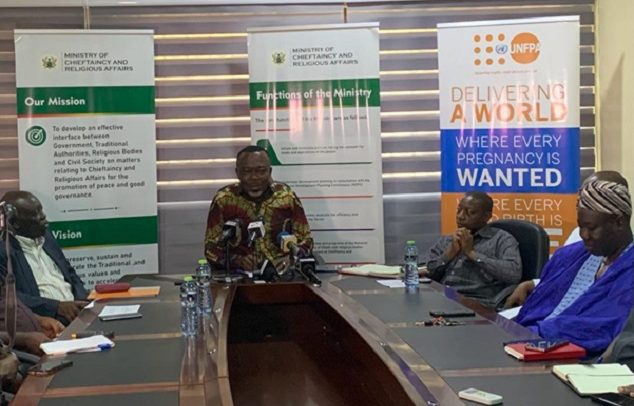Stephen Asamoah Boateng addressing the media
The Ministry of Chieftaincy and Religious Affairs has announced the scheduling of a series of national stakeholder consultations on the draft National Policy on Religion.
The consultations, scheduled from November 20 – 27, 2023, in regional capitals is to deepen the engagement between the ministry, its stakeholders and the general public as part of the review process of the policy.
The National Policy on Religion aims to address the challenges and opportunities that arise from the coexistence of different faiths and beliefs in the society.
It is envisaged to provide a framework for the protection and promotion of the rights and freedoms of all religious groups, as well as the prevention and resolution of conflicts that may arise from religious differences.
Speaking with the media in Accra on the scheduled regional consultations, sector minister, Stephen Asamoah Boateng, said the discussions will be held in all 16 regions of the country.
“These consultations are crucial steps in the development of a comprehensive and inclusive policy that will promote religious harmony, diversity and tolerance in our country,” he said. “We want to listen to your views, concerns, suggestions and recommendations on how to shape a policy that reflects the aspirations and values of our people,” he said.
He further assured that the consultations will be conducted in a participatory, transparent and respectful manner.
“We encourage you to share your perspectives and experiences with us, as well as with each other. We also urge you to engage in constructive dialogue and mutual understanding, while respecting the diversity of opinions and beliefs that exist among us,” he added.
Policy Justification
Mr. Asamoah Boateng said the government legal framework for management of religious affairs is underpinned by Article 21(1)(c) of the 1992 Constitution which states that, ‘all persons shall have the right to freedom to practice any religion and to manifest such practice’.
He explained that although all religious bodies are independent and are required to register their entities at the Registrar-General’s Department, there are currently no established governmental bodies that have oversight responsibility regarding religious activities other than the Ministry of Chieftaincy and Religious Affairs.
He noted that there are numerous concerns within the religious bodies that needed to be addressed.
“It is in this regard that my Ministry has been working with key stakeholders to put together a draft proposed government policy for direction of religion designed to protect the rights and freedoms of all citizens, regardless of their beliefs or non-beliefs,” he said.
He indicated that whilst my Ministry appreciates and commend the wonderful works of some religious leaders, “we also wish to take proactive measures to engineer the necessary reforms needed for addressing the worrying issues that has sprung up.”
These stakeholder consultations have been made possible through technical and financial support of the United Nations Population Fund Ghana Country Office.
By Jamila Akweley Okertchiri


